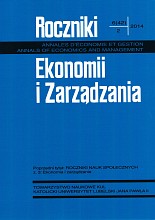Austriacka szkoła ekonomii i jej przedstawiciele
The Austrian School of Economics and its Representatives
Author(s): Mariusz JanikSubject(s): Economy
Published by: Towarzystwo Naukowe KUL & Katolicki Uniwersytet Lubelski Jana Pawła II
Keywords: Austrian school; economic liberalism; Ludwig von Mises; Friedrich von Hayek; monetary business cycle; activity theory; subjectivism; criticism of the welfare state
Summary/Abstract: The Austrian school of economics experienced both its heyday and stagnation. The first wave of Austrian economists, such as C. Menger, F. von Wieser, E. von Böhm-Bawerk was so widely recognized that most of its assumptions were practically incorporated into the mainstream. The next generation, that is F. von Hayek and L. von Mises, also enjoyed universal recognition among economists, however, most of their lifetimes fell on the period when J. M. Keynes’ theories became immensely popular, as they showed an easy way to overcome the crisis of 1929-1935 that was allegedly a crisis of the capitalist economy, the economy so much promoted by Hayek or Mises. The Austrian school regained its renown in the 1970s, when the world’s most developed economies were affected by the greatest economic crisis since the 1930s. The crisis consisted in simultaneous occurrence of a high inflation and unemployment, that is stagflation. In Keynes’ theory this phenomenon was not explained. It was also in the 1970s that Hayek was awarded the Nobel prize, which aroused interest in the Austrian school. At the same time I. M. Kirzner and M. Rothbard who worked in American universities did great work to develop and promote the Austrian school.
Journal: Roczniki Ekonomii i Zarządzania
- Issue Year: 42/2014
- Issue No: 2
- Page Range: 43-75
- Page Count: 33

